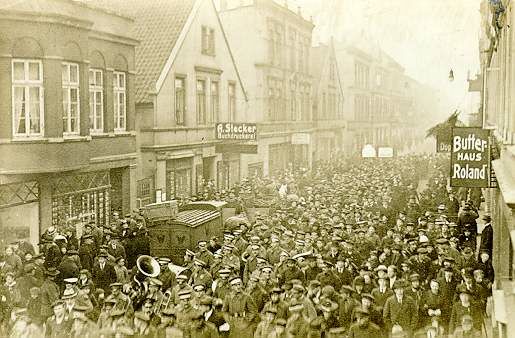Posted February 15, 2011
Translator’s note. Mainstream historians typically focus on the human cost of revolution in the form of violence, terror, lost lives, economic disorganization, the rise of dictatorships, etc. In this piece, Marxist economist Ernest Mandel describes the far greater costs to humanity of a revolution that did not succeed.
The “Human Cost” of Revolutions that Never Happened
Ernest Mandel

In November/December 1918 and in March 1920, a Germany governed by workers councils was on the agenda. The defeat of both the workers uprising of 1918-19 and of the beginning revolution in 1920, however, was brought about by two factors: 1) the collaboration of the Social Democracy (which represented a majority political party within the working class) with the military and bourgeois elites, and 2) the immature and weak leadership of the revolution itself.
The German working class paid a high price for this missed opportunity, as did a large portion of the world’s population.
One cannot, of course, substitute an imaginary “What would have happened if” for the real historical process which did occur. But it is possible to empirically demonstrate that alternative outcomes were objectively possible.
Revolutionary and counterrevolutionary classes, along with significant layers of these classes and their representative parties, inevitably play decisive roles. But classes and parties consist of people, each individual with his or her own subjectivity. And “leading personalities” play a central role as well, both in the rise and in the fall of revolutions, because the subjective factor (insight, decisiveness, the ability to clearly express the interests of the class, the ability to rouse the class to action, etc.) plays a key role whenever there are crucial turning points in the historical process.
The following five theses are more than pure speculation; they are empirically provable:
1. The defeated German revolution of 1918-19 and the strangled revolutionary possibilities of 1920 and 1923 were a watershed in the history of the 20th century. A victorious revolution in Germany and cooperation with the Russian revolution in the first months and years after the collapse of the Wilhelmine empire were considered to be realistic possibilities by contemporary observers – perhaps even more clearly by the counterrevolution than by the Communist International. One need only look at the statements of Winston Churchill and Marshal Foch.
2. Uniting the victorious October Revolution with a victorious revolution in Germany and Austria would have reshaped the entire region of Middle and Eastern Europe, including Italy. Even without an extension to France and England, the socialist confederation would have steered the history of Europe and the whole world onto different tracks.
3. The victory of the bureaucratic dictatorship in Soviet Russia would have been unlikely. What was decisive for the growing weariness of the Soviet working class and the decline in self-activity from 1920 on, and therefore for the victory of the Stalinist dictatorship over this class, were two things: 1) hunger and disorganization of the economy brought about by the world war and the civil war, and, 2) the dwindling hope of the Russian working class for world revolution. These two decisive factors for the victory of the bureaucratic dictatorship could have been largely avoided through a merger of a workers-council Germany with Soviet Russia. German industry and the Russian market, united under the leadership of the working class, would have enabled the malaise to be quickly overcome.
4. A wide swath of Europe would have been spared the devastation of the Great Depression that began in 1929.
5. The crisis of the colonial empires would have broken out 20 years earlier. At least one hundred million people who perished in the years between 1918 and 1945 could have been saved.
This is the scope of the world-historical tragedy of the missed German revolution of 1918/19. There would have been neither Stalin nor Hitler, neither Auschwitz nor the Gulag, nor, in all probability, the Second World War.
From Ernest Mandel: Drei Niederlagen der deutschen Revolution 1918/19: Eine weltgeschichtliche Tragoedie. (Three Defeats of the German Revolution of 1918/19: A World-Historical Tragedy). In Jakob Moneta: Mehr Macht fuer die Ohnmaechtigen. (More Power for the Powerless).
